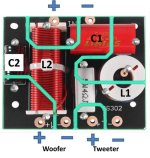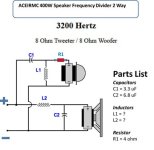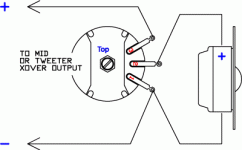My recent project is to experiment at improving the sound of a pair of 2-way 1980’s Spectrum 208’s base reflex speakers with an 8” woofer and 3” paper cone tweeter crossed over at 2500 HZ. The base response is excellent so the original woofer was retained. The upgrade will be for the an off the shelf 2nd order crossover and ¾” dome tweeter. This is a budget project to achieve state of the art audiophile sound for under $100 in parts :>).
After plugging the tweeter hole and then routing it to fit the new Peerless ¾” tweeters the fit and appearance was excellent. The results has been a big improvement to the original paper cone tweeters and in fact I am enjoying the sound immensely.
This leads me to requesting thoughts on the design of this budget off the shelf 2nd order crossovers (see images). Face it, it is cheap at $9.50 but it was a significant improvement over the original 1st order crossover I replaced. As a note, I did replace the 6.8 uF electrolytic capacitor with a poly film capacitor of the same value. That is one large capacitor!
My questions are:
1.What is the purpose of the 4 ohm resistor installed for the tweeter in this general application crossover? I ask this since my woofer and tweeter are within 1db sensitivity so why would this 4 ohm resister be added?
2.If I where to add an L-Pad to the tweeter, would I remove the 4 ohm resister from the XO?.
Any thoughts would be welcome!
After plugging the tweeter hole and then routing it to fit the new Peerless ¾” tweeters the fit and appearance was excellent. The results has been a big improvement to the original paper cone tweeters and in fact I am enjoying the sound immensely.
This leads me to requesting thoughts on the design of this budget off the shelf 2nd order crossovers (see images). Face it, it is cheap at $9.50 but it was a significant improvement over the original 1st order crossover I replaced. As a note, I did replace the 6.8 uF electrolytic capacitor with a poly film capacitor of the same value. That is one large capacitor!
My questions are:
1.What is the purpose of the 4 ohm resistor installed for the tweeter in this general application crossover? I ask this since my woofer and tweeter are within 1db sensitivity so why would this 4 ohm resister be added?
2.If I where to add an L-Pad to the tweeter, would I remove the 4 ohm resister from the XO?.
Any thoughts would be welcome!
Attachments
You can just short out that resistor.
Either remove it and use the holes for a jumper, or add a shorting wire across the resistor.
No real reason to remove it, if shorted.
Either remove it and use the holes for a jumper, or add a shorting wire across the resistor.
No real reason to remove it, if shorted.
I just got to ask, if the resistor is shorted, creating zero ohms, then would there be any output from the tweeter?
Thanks for the info so far. So in my project with both speakers being 8 ohm, Shorting the resistor would be a good place to start. If my tweeter would have been a 4ohm, then this may explain the 4 ohm resistor included in this off the shelf XO. Does that sound like a logical explaination for the resistors addition to the circuit in a generic XO?
I'd say this crossover is designed for 4 ohm drivers which start with the same sensitivity and which are in a box with a baffle step near the crossover.
@mteetank
The resistor is included in this generic crossover because the tweeter is usually louder than the woofer.
As has been said, the inclusion of the resistor makes the tweeter quieter. The value of 4 ohm for this resistor is only an estimate made by the crossover designer as to how much attenuation of the tweeter level is required, and the resistor might usefully be changed in value to suit the actual tweeter used.
Importantly, you should make sure the commercial crossover you are using is designed for 8 ohm drivers like yours and not for 4 ohm drivers. Crossovers come in both 8 ohm and 4 ohm types and you need to use the correct type to ensure the drivers blend together correctly.
The resistor is included in this generic crossover because the tweeter is usually louder than the woofer.
As has been said, the inclusion of the resistor makes the tweeter quieter. The value of 4 ohm for this resistor is only an estimate made by the crossover designer as to how much attenuation of the tweeter level is required, and the resistor might usefully be changed in value to suit the actual tweeter used.
Importantly, you should make sure the commercial crossover you are using is designed for 8 ohm drivers like yours and not for 4 ohm drivers. Crossovers come in both 8 ohm and 4 ohm types and you need to use the correct type to ensure the drivers blend together correctly.
- Home
- Loudspeakers
- Multi-Way
- Purpose of a resistor in an “off the shelf” budget Crossover?


